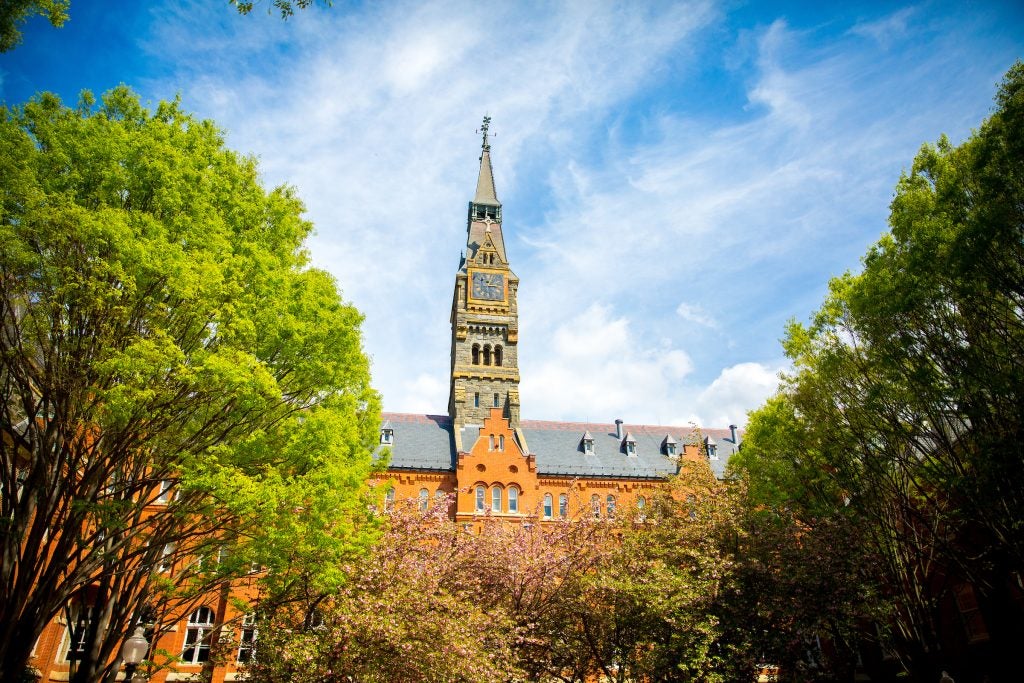
Two Georgetown juniors have been named 2025 Truman Scholars, a prestigious graduate scholarship for aspiring leaders in public service.
Georgetown is one of only five institutions with more than one Truman Scholar in this year’s cohort.
Kanmani Duraikkannan (CAS’26) and Izzy Wagener (SFS’26) join a cohort of 54 students who were selected from more than 700 nominated candidates.
The Truman Scholarship recognizes students with leadership potential, a career focus in government or the nonprofit sector, and academic excellence. Each Truman Scholar receives funding for graduate studies, leadership training, career counseling and internship and fellowship opportunities in the federal government.
Kanmani Duraikkannan (C’26) is a transfer student in the College of Arts & Sciences who’s worked to advance gender equity both abroad and in DC, and Izzy Wagener (SFS’26) is a junior in the School of Foreign Service who focuses on First Amendment challenges to the press.
“We are so proud of Kanmani and Izzy’s recognition as Truman Scholars,” said Lauren Tuckley, director of the Center for Research & Fellowships. “They both demonstrate academic excellence, a passion for making the world better, and demonstrated leadership. We know they will advance generations of Hoyas’ leadership in public service.”
Learn more about their paths to Georgetown and how the Truman Scholarship will enhance their career goals in public service.
When Kanmani Duraikkannan (C’26) studied abroad at The American College of Greece in Athens two and a half years ago, she became aware of the traditional gender expectations that shaped the lives of the women around her.
“Many felt pressured into conventional family roles or dated much older men,” Duraikkannan wrote in their Truman Scholarship application. “Later, I discovered that Greece ranked last in the EU Gender Equality Index, revealing a stark contrast to the generosity I had experienced.”
Duraikkannan, who uses they/she pronouns, decided to start a women empowerment club.
She was a University of Delaware student at the time, and even though study abroad students were not allowed to create clubs, she pushed ahead anyway. After multiple meetings and outreach, Duraikkannan secured administrative approval and recruited a faculty mentor. The club’s weekly meetings soon drew over 20 students and is still active.
“One of my biggest talents is getting people to feel connected and safe and open up to me,” says Duraikkannan. “I can create those communities for other people.”
Last fall, Duraikkannan transferred to Georgetown to access more opportunities in DC and take classes geared toward their interests. The junior has also continued their work on gender equity.
At Georgetown, Duraikkannan, a government major with a double-minor in computer science and science, technology, and international affairs, serves as the director of diversity and community development for the Georgetown University Student Association.
Duraikkannan is also an advocacy intern at DAWN, a nonprofit organization that supports democracy and human rights in the Middle East and North Africa. Last summer, they interned at the White House Initiative for Historically Black Colleges and Universities, followed by a stint as an AI policy and strategy intern at the U.S. Department of Commerce.
With the Truman Scholarship, Duraikkannan plans to pursue a master’s in quantitative economics to address gender disparities through data-driven policy design. Longer term, they are interested in working at a nonprofit like the American Civil Liberties Union and want to serve as a state representative in Delaware.
Duraikkannan’s time at Georgetown has motivated her to pursue a master’s degree.
“At Georgetown, whatever specific interest you have or whatever niche you have in government, they have a class for that,” Duraikkannan says. “When you talk to professors, if you tell them you want to do something, they believe that you’re going to do it. The people here believe that, and they try to get you as many resources as possible.”
Izzy Wagener (SFS’26) has been focused on the First Amendment since high school.
The junior remembers first experiencing editorial restrictions as a student journalist for her high school newspaper in Edina, Minnesota. Some of the newspaper’s articles had to be reviewed by administrators before publication, she said, a precaution that sparked her interest in the freedom of the press and student rights.
When she arrived at Georgetown, Wagener joined Georgetown’s Free Speech Project to learn more about the First Amendment and its impact on the press. She researched and wrote memos for the project’s Free Speech Tracker and helped map First Amendment challenges nationwide, including book bans. She also got involved in campus media, working as a writer and photo editor for The Georgetown Voice, and took a class in data journalism, where she learned more about investigative journalism and holding leaders and institutions accountable.
“Working in campus media, and being surrounded by people who are as passionate as I am about journalism, definitely inspired me to continue this path,” she said.
With the Truman Scholarship, Wagener plans to pursue graduate studies in investigative journalism, where she can hone her skills in reporting and visual storytelling. She hopes graduate school will also equip her to tackle local news crises and deepen her work in accountability journalism — particularly on pressing issues such as labor rights.
“Underfunded and overwhelmed, the regulatory bodies that oversee labor violations are often supplemented by the work of journalists,” Wagener says. “I’ve read countless investigative pieces that calculated wage theft and uncovered preventable workplace tragedies. This is work that I want to continue.”
Having grown up in a suburb with one local newspaper, Wagener knows first-hand the public service that reporters provide. She wants to dedicate her career to press freedom advocacy to help protect other journalists and their work.
“In a world with proliferating online misinformation and government censorship, it’s not only journalists who need assistance but consumers of information, too. The media industry, and access to information, is changing rapidly,” she says. “As a journalist, I see it as my responsibility to help parse out this complicated future.”
By Kelyn Soong and Siobhan Cooney
Georgetown University
37th and O Streets, N.W.
Washington, D.C. 20057
P. 202-687-0100

Recent Comments